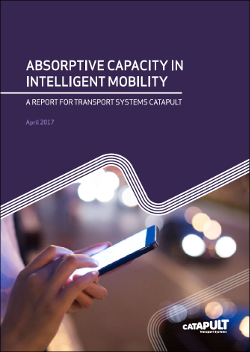Ungated Post | 23 Aug 2017
Absorptive Capacity in Intelligence Mobility

The Transport Systems Catapult identified seven priority market segments for the Intelligent Mobility (IM) market in the years ahead. They were i) intermodal smart-ticketing, ii) security, resilience and cyber security, iii) Internet of Things asset management (road), iv) monitoring and management systems for road infrastructure, v) data management and analysis, vi) data collection and communication platforms, and vii) autonomous vehicles.
In this study, Oxford Economics undertook a feasibility assessment to help understand if the UK’s absorptive capacity for these technologies could be measured in different IM market segments. This means the ability of companies to turn innovation activities into commercial gains. The tentative results indicate that it would be in the interest of firms to invest more in R&D, hire more specialists, invest in improving their knowledge absorption capabilities and partner with other firms.
Oxford Economics’ team is expert at applying advanced economic tools that provide valuable insights into today’s most pressing business, financial, and policy issues.
To find out more about our capabilities, contact:
Americas
Diantha Redd
+1 (646) 503 3052
Email
Asia Pacific
Peter Suomi
+65 6850 0110
Email
EMEA
Aoife Pearson
+44 (0)203 910 8054
Email
Related Services

Post
The economic impact of abandoning the WTO
Oxford Economics have been commissioned by the International Chamber of Commerce (ICC) to provide an independent assessment of the economic impact of WTO dissolution. This report details our findings and the assumptions underpinning our analysis.
Find Out More
Post
The economic impact of the sports activities of public service media
This study shows how the sports activities of public service media supported €4.5 billion of GDP and 57,000 jobs across 31 European countries in 2022. The report also highlights wider economic benefits of public service media sports coverage, such as the way in which it leverages sponsorship income for sports bodies.
Find Out More
Post
Global Trade Education: The role of private philanthropy
Global trade can amplify economic development and poverty alleviation. Capable leaders are required to put in place enabling conditions for trade, but currently these skills are underprovided in developing countries. For philanthropists, investing in trade leadership talent through graduate-level scholarships is an opportunity to make meaningful contributions that can multiply and sustain global economic development.
Find Out More